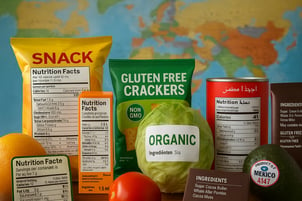A Guide to Cosmetics Regulations in Australia
Understanding GMP in Cosmetics & Personal Care Industry
Beauty and personal care products are among the most important consumer product categories in the world today, driven by a remarkable demand for products to enhance beauty, hygiene, skin health, and finally confidence. These products are integral parts of our daily life from home, office to ballrooms. Due to the daily use, it is of utmost importance to assure the safety, efficacy, and quality of these products. That is where Good Manufacturing Practices (GMP) and overall cosmetics and personal care compliance come into the picture.
Good Manufacturing Practices (GMP) is the foundation for making safe cosmetic and personal care products. These guidelines practically ensures all products, including shampoo, lotion, deodorant, and makeup are made under controlled conditions. This means consistency, consumer safety, and no contamination, ultimately forming the backbone of Cosmetic GMP and GMP cosmetics standards.
Social Media’s Influence on Consumer Awareness
Consumer knowledge is ever-increasing in this segment, Instagram's beauty influencers boasted 500 million followers in 2021, while TikTok's viral beauty trends spurred 150% product sales growth. In the era of growing social media and influencers, consumers are well-informed and share their experiences more widely. Off late consumer awareness has made them to lean towards more natural and herbal alternatives, pushing the companies to reach out for more natural and sustainable ingredients. With this rising awareness, expectations around cosmetics production hygiene have also grown significantly.
Why GMP is Essential in Cosmetics & Personal Care Manufacturing
Product experiences can vary widely depending on individual skin types, sensitivities, and expectations. Some common problems include - allergic reactions to the ingredients, over-exposure to preservatives, incorrect dosage and exposure to toxic chemicals. Cosmetic and personal care products touch the skin, hair, and sensitive areas like eyes and lips directly, making strict manufacturing for personal care essential.
GMP ensures:
-
Consumer Safety: Reduces risk of microbial contamination, mislabelling of ingredients, and product adulteration.
-
Compliance: Meets FDA regulations and international standards.
-
Brand Integrity and Consumer Trust: Builds product safety and customer loyalty.
-
Consistency in Production: Guarantees that each batch complies with uniform safety and quality standards under GMP cosmetics guidelines.
Enforcement & Compliance Trends
Non-compliance continues to be a significant concern in the cosmetics sector. In the beginning of 2024, the FDA denied entry to 697 shipments of imported cosmetics from 36 different countries, pointing out issues such as microbial contamination, incorrect labelling, and deceptive claims, including improper representation of cosmetic GMP adherence.
In 2023 European Union (EU) adopted regulations to update product labelling for perfume related allergies. The regulation updated the list from 24 to 80 allergens with a transition period of 3 years to adapt to new requirements.
These trends underscore the necessity of adhering to Good Manufacturing Practices (GMP) in order to prevent regulatory fines and product detentions, reinforcing the importance of cosmetics and personal care compliance.
Key GMP Guidelines for Cosmetics & Personal Care Industry
Today companies formulate, source ingredients, manufacture and ship products to and from different regions. Being a globally integrated company one needs to adhere widely acceptable procedures and practices. Introduction of ISO 22716 marks a major step in the realisation of a globally recognised standard for cosmetic products safety and cosmetics production hygiene:
Some of the key elements of GMP under ISO 22716 include:
- Personnel and Training
- Staff members are required to follow rigorous hygiene and safety protocols.
- Continuous training on contamination risks, use of proper equipment, and adherence to GMP regulations strengthens manufacturing for personal care.
- Standards for Facilities and Equipment
- Production areas should be kept clean, properly ventilated, and protected against cross-contamination risks.
- Regular cleaning, calibration, and maintenance of equipment are essential to prevent microbial growth.
- Quality Control of Raw Materials
- All components must meet purity standards and undergo contamination evaluation.
- Proper labelling and storage of raw materials are essential to prevent degradation.
- Quality Control and Production
- Manufacturers must establish documented procedures for every stage of production, starting from mixing to packaging.
- Testing during production ensures that the product meets GMP cosmetics quality requirements before distribution.
- Final products are required to meet standards for safety, stability, and performance.
- Compliance and Labelling
- Labels on products must list ingredients accurately in order of decreasing weight.
- Labels should refrain from making false claims, such as asserting that a cosmetic is “FDA approved” if it is not.
- Record Management and Documentation
- Batch production records must be maintained to ensure traceability and preparedness for recalls.
- Any deviations and corrective measures must be recorded and addressed.
- Inspections and Audits
- Regular internal audits are essential for ensuring continuous compliance.
- The FDA conducts random inspections and can issue warning letters, detain products, or block imports in cases of non-compliance.
GMP as a Competitive Advantage in a Changing Industry
With the global cosmetics and personal care segment at US$650 Bn+ and growing, it is more than simply observing compliance in both cosmetics and the personal care industry. It aims at consumer satisfaction and safety along with branding. In a world in which consumers increasingly come into intimate contact with the ingredients and processes behind their favourite products, GMP function as a huge differentiator in manufacturing for personal care.
How Does A PLM Help in Maintaining GMP in This Industry
A robust PLM system helps cosmetic & personal care brands maintain GMP compliance by digitising formulation management, tracking raw materials, and ensuring seamless collaboration between the stakeholders. It centralises regulatory documentation, reducing the risk of errors and non-compliance while accelerating approvals. With real-time visibility into the product lifecycle, manufacturers can maintain consistency, improve traceability, and streamline audits, ensuring every product meets safety and quality standards under cosmetic GMP and GMP cosmetics expectations.
Final Thoughts
For all the industries, GMP involves investment in their future business scale, brand, and financial success. By focusing on safety, quality, and sustainability, GMP helps these businesses to stay ahead in an increasingly competitive market. Since the cosmetics and personal care industries continue to grow, GMP will remain the strongest pillar of responsible and successful manufacturing practices. Explore how Plevenn simplifies cosmetics and personal care compliance, enhances efficiency, and drives innovation in the beauty and personal care industry.
Feb 7, 2025 10:22:54 AM








